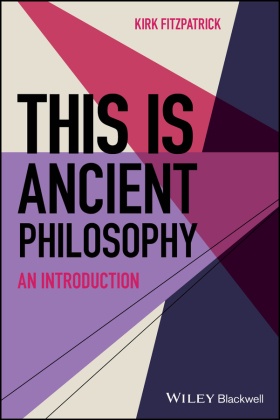This is Ancient Philosophy - An Introduction
| Verlag | Wiley & Sons |
| Auflage | 2024 |
| Seiten | 256 |
| Format | 15,2 x 1,7 x 23,0 cm |
| Gewicht | 388 g |
| Artikeltyp | Englisches Buch |
| Reihe | This is Philosophy |
| EAN | 9781119879404 |
| Bestell-Nr | 11987940UA |
THIS IS ANCIENT PHILOSOPHY
"A masterful introduction to ancient philosophy. Fitzpatrick knows the contemporary scholarship on these authors, so he can shift from summarizing their thought to scrutinizing individual arguments. Meanwhile the writing remains so accessible that a reader might not notice how much he covers. The prose is precise but relaxed, with details that enrich the texture: the Pythagoreans' harmonies, the Stoic Horned Argument, Antisthenes' daily walk to Socrates. Students and instructors alike will benefit."
--Nickolas Pappas, Professor at City College of New York (CUNY)
This Is Ancient Philosophy is a fascinating introduction to the major philosophers and foundational concepts of classical antiquity.
Assuming no prior knowledge, the book uses an intuitive, readable narrative style as it examines the ideas, influences, and interconnections of philosophers such as Socrates, the Sophists, Plato, and Aristotle, as well as philosophical sch ools of thought including Cynicism, Epicureanism, Stoicism, and Skepticism.
Divided into three parts, the book opens with an overview of early Greek philosophy, describing the turn from mythological thinking to philosophical analysis. The second part focuses on the distinctions between the subjects of philosophy in both the Golden Age and today, followed by a survey of the Hellenistic period and a discussion of the relation between fate and freedom of action. Throughout, readers are aided by a wealth of instructive and engaging charts, grids, figures, and a detailed map illustrating the chronological development of philosophy, from Asia Minor to southern Italy and Athens.
Part of the popular This Is Philosophy series, This Is Ancient Philosophy is an excellent text for students of philosophy, both introductory and advanced, and general readers with interest in the philosophy of the classical era.
Inhaltsverzeichnis:
Acknowledgments xi
Map xii
Introduction 1
The Precursors of Philosophy: Homer and Hesiod 1
This Is Ancient Greek Philosophy 4
Part I Early Greek Philosophy 9
1 Miletus and Elea 11
1.1 Miletus 11
1.1.1 Thales 11
1.1.2 Anaximander 16
1.1.3 Anaximenes 19
1.1.4 Xenophanes 21
1.2 Elea 24
1.2.1 Parmenides 24
1.2.2 Zeno 27
1.2.3 Empedocles 31
2 Ionia and Thrace 34
2.1 Ionia 34
2.1.1 Pythagoras 34
2.1.2 Anaxagoras 39
2.1.3 Heraclitus 42
2.2 Thrace 46
2.2.1 Leucippus and Democritus 46
3 The Philosophic Turn 53
Part II The Golden Age 69
4 Plato 71
4.1 Biography and Texts 71
4.2 The Socratic Dialogues 74
4.3 The Sophists 85
4.4 Plato's Philosophy 91
4.4.1 Knowledge 91
4.4.2 The Forms 94
4.4.3 The Cave, Line, and Sun 99
4.4.4 The Sou l 102
4.4.5 The State 107
5 Aristotle 116
5.1 Biography and Texts 116
5.2 Aristotle's Philosophy 119
5.2.1 The Subjects 119
5.2.2 Doxography 122
5.2.3 The Four Causes 123
5.2.4 Hylomorphism 124
5.2.5 Voluntary Action 129
5.2.6 Knowing and Doing 130
5.2.7 Virtue 133
5.2.8 Politics 137
6 The Subjects of Philosophy 143
Part III Hellenistic Philosophy 151
7 Cynicism and Epicureanism 153
7.1 Alexander's Death 153
7.2 Cynicism 155
7.2.1 Antisthenes 155
7.2.2 Diogenes of Sinope 158
7.3 Epicurus and Epicureanism 160
7.3.1 Physics, Canon, and Ethics 163
7.3.1.1 Physics 163
7.3.1.2 Canon 164
7.3.1.3 Ethics 166
7.3.2 Lucretius as Epicurean 169
7.3.2.1 Physics 170
7.3.2.2 Canon 172
7.3.2.3 Ethics 174
8 Stoicism and Skepticism 176
8.1 Stoicism 176
8. 1.1 The Stoics 176
8.1.2 Stoic Philosophy 177
8.1.2.1 Physics 178
8.1.2.2 Logic 182
8.1.2.3 Ethics 187
8.1.2.3.1 Desire 189
8.1.2.3.2 Duty 192
8.1.2.3.3 Assent 194
8.2 Skepticism: Pyrrhonians and Academics 196
8.2.1 History 196
8.2.2 Pyrrhonism 197
8.2.3 The Academics 200
8.2.3.1 Arcesilaus 200
8.2.3.2 Carneades 203
9 Fate and the Good Life 207
9.1 Historical Context 207
9.2 Moral Weakness as Akrasia 209
9.3 Fate and Voluntary Action 227
9.4 The Good Life 231
Index 235

